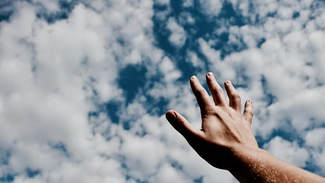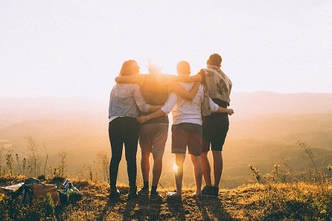 On Being the Safe Place to Land To recognise the importance of Mental Helath Awareness week, our blog this week is presented by Una, our iRest Meditation Teacher. Today is the start of Mental Health Awareness Week here in NZ. And it seems, on the whole, that we are becoming more attuned to the increase of anxiety and depression so many of us are now experiencing, either first-hand or as a friend or family member. In fact, as I write this, I can immediately think of at least two people who recently found the struggle too much to bear: Anthony Bourdain and Greg Boyed. And I am both sad and grateful to them. In death they have brought more attention to this issue. They make us pause and consider our own lives and what we might do differently to support those in such severe distress that taking their own life seems the only way out from under. The stats certainly do shed light on the staggering reality of our mental health issue - (and I say “our” because it’s not just a matter of telling those struggling to deal with it, but a question of how we all come together to meet this issue.) In NZ, there is an alarming increase in the number of suicides, with 660 people killing themselves in 2016/17. And this number is on a steady yearly rise. To put these stats into perspective - the Ministry of Health reports that, amongst Maori men, only heart attacks and lung cancer caused more death than suicide. For non-Maori men, suicide is only superseded by heart attack as the leading cause of death. Seriously, there are more men taking their own lives because of psychological distress than dying from stroke, car accidents and diabetes. And although women may not suicide as often as men, they are more likely to experience, and therefore be living with, anxiety and depression than their male counterparts. The Mental Health Foundation reports that, “These disorders [not a word I would choose] are in fact the leading cause of health loss amongst women in NZ.”  But the real question here is, what do we, as a community, do about all this? How do we actually meet those people that we share our living rooms and offices with? Those people feeling desperately overwhelmed that we share a classroom with? Our own children, friends and partners? Many people, through no fault of their own, (maybe even the majority of people) simply do not know how to help and really be there for those feeling overwhelmed in life. If we’re honest, we might realise we don’t necessarily know how to be there for our own selves, how to meet our own thoughts and emotions. So if this is you, you are not alone. Maybe it makes us uncomfortable and we just want all this to go away, or for that friend to get over it. Or maybe we just don’t know what to say, so we offer solutions like “You have so much to be grateful for.” Or, “Go outside and get some fresh air. That will make you feel better.” Not having experienced such states of distress, we may not have an understanding that approaches the life experience of those who do. And as human beings, we generally want what seems bad, negative, or uncomfortable to go away. This is human nature in action. But we can learn to respond in a more compassionately powerful way. I regularly see people in iRest meditation sessions that are dealing with acute or chronic stress. This is what I know from both my mindfulness-based work with anxiety and depression, and my personal experience living with them: trying to push away the uncomfortable only serves to make it grow into a stronger presence in your life, just like adding fuel to the proverbial fire. And that fuel is emotionally expensive for all involved. It’s exhausting to pretend nothing is wrong, or to live in a state of war with ourselves. Trying to hide from, refuse, bury, or paint a positive picture over what you are experiencing is psychologically and emotionally costly. Anxiety and depression (and the beliefs behind them) need to be seen, heard and connected to, just like the people in our lives who deal with them do. So here are some real-life ways to become the safe landing place for the people in your life who may be in pain, and the emotions and beliefs that you yourself might be feeling outdone by:
 Mental health is everyone’s responsibility - not just the ones who are suffering. The way we speak to ourselves and others, the way we fully meet (or fail to meet) what, in this present moment, is making itself known, is the difference between thriving and suffering. Let’s stop aspiring to just being happy every moment of our lives and realise that happiness is only really possible because of the pain that exists in contrast to it. Life is not always black or white, there is an awful lot of grey in the mix too. And that’s not just normal, this is how we live in harmony with life itself. There is pure perfection in all our imperfections as well. Una Hubbard iRest Meditation Teacher Comments are closed.
|
Appointmentsor call us
Tel: (04) 479 4680 Vertical Divider
|
Vertical Divider
|
ContactLocation: Address and map
63 Ottawa Road, Ngaio, Wellington Email: [email protected] Tel: (04) 479 4680 |

 RSS Feed
RSS Feed
